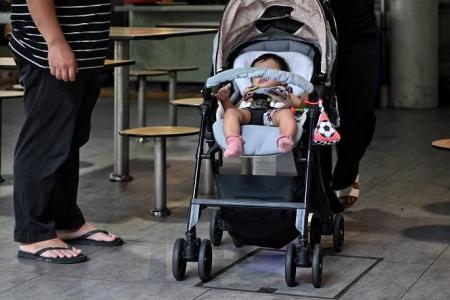New childminding scheme among efforts to support families
Parents with babies aged from two years to 18 months will have another infant care option from the second half of 2024, when a new scheme to develop affordable and reliable services to look after babies at a childminder’s house is launched.
Announcing the pilot childminding scheme in Parliament on March 6, Minister of State for Social and Family Development Sun Xueling said the Early Childhood Development Agency (ECDA) will fund appointed operators to keep fees affordable.
The aim is to keep childminding fees similar to what a median-income family pays, after subsidies, for infant care at centres run by anchor operators, she said. This sum works out to be around $700 a month.
She said families will be able to use the Child Development Account (CDA) to further defray the cost for the service, adding that more details will be released later in 2024.
The CDA is a special savings account for children that can be used to pay pre-school and healthcare fees, while anchor operators receive government grants that help offset costs, such as staff salaries, in return for meeting fee caps and quality criteria.
The pilot scheme, which will run for three years, aims to serve 500 infants in the first year. The Ministry of Social and Family Development (MSF) hopes to increase the number to about 700 babies subsequently.
Under the pilot, the ECDA will appoint child-minding operators, who will hire the child-minders.
Each child-minder will be allowed to look after up to three infants at a time at the child-minder’s house or at a community space, such as a community centre. Parents also have more flexibility to discuss their care preferences and requirements with the childminder, she added.
Ms Sun said that childminders, or nannies as some call it, are not a new concept, and it was more common in the 1970s and 1980s. Some of these nannies care for the babies in their own homes, while others do so at the child’s home.
She added: “They are less common today as parents may be unsure of where to look for trusted childminders or they may find childminding relatively more expensive as compared to other caregiving options, such as infant care centres.”
However, European countries such as the United Kingdom, France and Denmark, have given parents financial support for childminding services, such as subsidies, among their efforts to help parents meet their infant care needs, she said.
So the MSF is launching the pilot to offer parents another option for infant care, and it will work with appointed operators to expand infant childminding services here, she said.
She said: “Parents can have greater flexibility to choose what’s best for them, in terms of meeting their caregiving needs and preferences. For example, parents who may prefer a more structured setting during working hours may opt for infant care centres for their infants. Those who prefer more flexible hours or more individualised care in a home-setting may opt for childminders.”
As safety is a key consideration for parents when it comes to care arrangements, the ECDA will conduct background checks on operators and require them to meet certain service requirements.
This includes putting in place guidelines on practices to keep the child safe, ensuring that the childminder is trained in areas such as basic infant care and first aid, and establishing processes for incident management.
The ECDA will conduct background checks on the childminders, such as for criminal records and if they have committed child-related offences, a MSF spokesman told The Straits Times.
Get The New Paper on your phone with the free TNP app. Download from the Apple App Store or Google Play Store now

